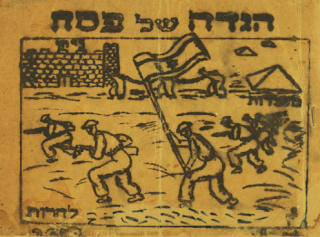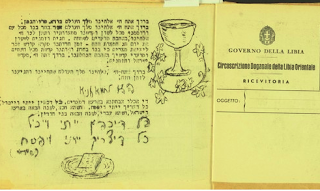
The Passover Seder of 1943 in Benghazi was a momentous occasion. It marked the routing of the Fascists and their German Allies from Libya, the re-establishment of British control and the gradual return of the Jews of Benghazi to their homes. Chen Malul reconstructed the event from the diaries of Rabbi Ephraim Urbach, who later became president of the Israel Academy of sciences and the Humanities. Story in The Librarians and Mosaic.
Many of the 600 participants of the Seder came from far away. During the battles, the Germans banished the Jews of Benghazi to Tripoli and they only started to return after the British had completely conquered Libya. Jewish Legion soldiers, Canadian, American, British, and Australian soldiers serving in the area also came to celebrate along with the Jewish community.
There were major logistical issues that occurred during the preparations for a war time Seder celebrations with the biggest among them being printing enough Haggadot for all the participants. To resolve this issue, the writers and editors confiscated telegrams and other letterheads from the offices of the Libyan authorities. On the backs of these scraps of paper they printed the haggadah with a typewriter and copied them with a Mimeograph machine.
The Benghazi Haggadah, front cover
HaLahma Anya printed on an official document of the Libyan Fascist government
Rabbi Urbach tells the story in his journal:
“At exactly a quarter past eight we entered the hall. It was a wonderful sight to see all the soldiers, from every service, and from all the armies fighting for the Allies, sitting at the tables. At the officers table sat 45 people, 12 of them American. When I stood and gave the signal to begin, a great quiet descended in the hall. I started in English and finished in Hebrew. I blessed the guests and thanked the hosts. I spoke of celebrating liberty, the destruction of the people of Israel in the diaspora, and the hope this holiday holds, especially the fact that we had the privilege of celebrating it in a place from which Jews had been banished only a year ago. I finished with a blessing: ‘As we have the privilege of celebrating Passover on the ruins of a grand and boastful empire, so to, next year we will celebrate Passover on the ruins of an evil and malicious kingdom as we come together in the land of our ancestors, redeemed and rebuilt.’”


Leave a Reply